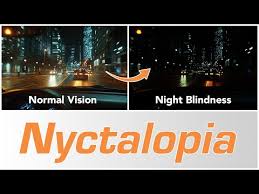 Nyctalopia also called night blindness )NB) is a condition making it difficult or impossible to see in relatively low light.
Nyctalopia also called night blindness )NB) is a condition making it difficult or impossible to see in relatively low light.
It is a symptom of several eye diseases.
Night blindness may exist from birth, or be caused by injury or malnutrition as with vitamin A deficiency.
It can be described as insufficient adaptation to darkness.
The most common cause of nyctalopia is retinitis pigmentosa, a disorder in which the rod cells in the retina gradually lose their ability to respond to the light.
Patients with this genetic condition have progressive nyctalopia and, eventually, their daytime vision may also be affected.
In X-linked congenital stationary night blindness, from birth the rods either do not work at all, or work very little, but the condition does not get worse.
Another cause of night blindness is a deficiency of retinol, or vitamin A1, found in fish oils, liver, and dairy products.
The inability to see in bright light, is known as hemeralopia and is much rarer.
The outer area of the retina is made up of more rods than cones, loss of peripheral vision often results in night blindness.
With night blindness patients not only see poorly at night but also require extra time for their eyes to adjust from brightly lit areas to dim ones.
Contrast vision may also be greatly reduced.
Rods contain a receptor-protein called rhodopsin, and when light falls on it, it undergoes a series of conformational changes ultimately generating electrical signals which are carried to the brain via the optic nerve.
In the absence of light, rhodopsin is regenerated.
The body synthesizes rhodopsin from vitamin A, which is why a deficiency in vitamin A causes poor night vision.
Refractive vision correction surgery may rarely cause a reduction in best night-time acuity due to the impairment of contrast sensitivity function (CSF) which is induced by intraocular light-scatter resulting from surgical intervention in the natural structural integrity of the cornea.
Causes of night blindness
Cataract Certain medications, such as phenothiazines Choroideremia Chronic pancreatitis – presumably due to malabsorption of vitamin A Glaucoma Oguchi disease Pathological myopia Refractive surgery (LASIK, photorefractive keratectomy, radial keratotomy) Retinal detachment Retinitis pigmentosa Sorsby’s Fundus Dystrophy (Macular degeneration) Visual snow Vitamin A deficiency; often via xerophthalmia
